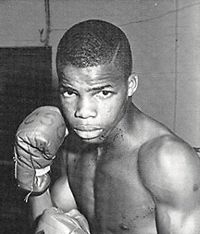Ringside Report Looks Back at World Title Challenger Johnny “Super D” Duplessis
[AdSense-A]
 By Donald “Braveheart” Stewart
By Donald “Braveheart” Stewart
It’s been a week where we have seen, once again, people who think it is OK to insult fighters on our forums on Ringside Report – fear not they have lifetimes on them as short as their attention spans. My Facebook timeline has seen “Bad” Brad, my patient friend and editor, having to resort to ban people for their attitudes. When I consider the risks associated with getting into a ring I despair. How is it possible that people are unable to see just how dangerous it is for people to lace a glove, stand apart from another person who wants to knock you out and fight?
Now I know, and I never laced a glove.
When you see the effect of this form of entertainment on a glorious warrior like Wilfred Benitez, how can anyone insult any boxer?
This week “Bad” Brad gave me a fighter to look into, who has truly humbled me. Now I will admit that the name was something I had at the back of my mind but like many Scottish writers and observers of the sweet science we get our optics from where we sit; I was unfamiliar.
One of the great things about writing for Ringside Report is that I get the privilege of getting to look around and spot as well as write about serious boxers from yesteryear.
This week it was a man with such a rich story and history as Johnny “Super D” Duplessis, 40-3, 26 KO’s.
Not only is he a former world champion but a survivor of Hurricane Katrina, a counsellor and is also registered blind after his last fight left him so; humility begun but still to be rest assured.
From the age of 10 years old he was someone who has had the tag champion, given that he became one and considering what he faces on a daily basis it is a title he wears well.
His debut into the professional ranks came in 1984 against Willie Covington, knocking him out in the 2nd round. He remained undefeated for the next 27 contests though he did not have it all his own way. In 1987 he had to get up off the floor to beat Anthony Williams.
By 1987 the first professional title of note, the WBC Continental Americas title was his at lightweight when he stopped Nelson Bolanos in the 6th round in the Superdome in New Orleans.
Perhaps unfairly it was his 1991 contest, against Julio Cesar Chavez in Las Vegas that gets the most mentions. For the WBC and IBF titles at super lightweight, the evening of the 18th March was not a great one for Duplessis.
Going into the fight, Duplessis was a 40 fight seasoned professional. He looked the part and he was fit enough. He had supremely confident, apparently always talking a good game though nobody expected Duplessis to win. What they did expect was that he would cause Chavez trouble. It was believed that he would at least take him the distance.
When the two were brought to the center of the ring, Duplessis appeared to freeze. In the UK just now we are just beginning to get over the “what happened to AJ against Ruiz” debate but something similar must have happened after the Chavez/Duplessis fight. Duplessis went down and out in the 4th. It was an ignominious end to his only world title appearance.
On the 21st July 1995, in New Orleans, he finished his career against Adrian Stone where the effects of the contest damaged his peripheral vision. He was stopped in the 5th round and his boxing career was ended.
It certainly did not dim his enthusiasm for learning as he studied at Southern University in New Orleans, eventually graduating with a Master’s Degree in Social Work. What makes his story even more remarkable is that whilst studying he worked helping the homeless and the disabled.
Hurricane Katrina forced him out the city of New Orleans, the place where he was known and adored. Settling as he did, like so many refugees from Katrina, in Birmingham Alabama, it was a journey which, given his eyesight, was perilous in itself. He traveled there by car, driving himself. His wife was already there waiting for him. Having to frequently stop and stare at the road signs, he eventually got himself to join his wife in safety. It was a journey that took 16 hours when it normally only took 6.
Birmingham was a place where he settled and began working with victims of Hurricane Katrina, no doubt taking his experiences and putting them to exceptionally good use. In an interview, one of very few that I was able to access online, John was to comment at that time, “my daily life has been consumed with trying to help individuals with disabilities find employment and helping career center staff to better serve job seekers with disabilities and provide resources and access to special programs and services.”
And so I believe he continues to do so to this day. Though the program with which he was working at the time of that interview has finished the level of service throughout his life has been one worth serving. Next time you feel the need to call out a fighter who you think has no cahones, consider how big yours are to hide behind a keyboard whilst people like Duplessis use it for good.
[si-contact-form form=’2′]

